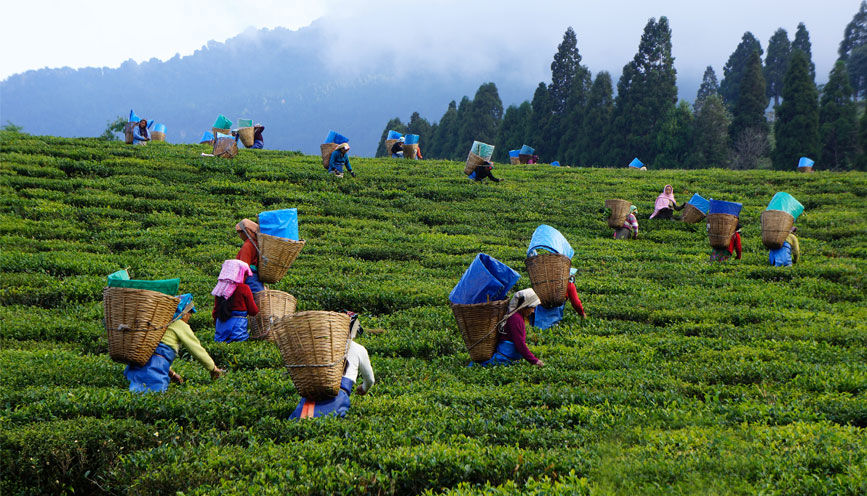NISHA CHETTRI, SNS, KALIMPONG, 6 SEPTEMBER: Amid growing concerns over the protracted stalemate in the Hills of Darjeeling and Kalimpong and the fight between two factions of the dominant party, the Gorkha Jan Mukti Morcha (GJMM), workers in the famed tea gardens of the hills and the Dooars have been forced to look for alternative means to earn their daily bread.
Paralysed under the total and indefinite shutdown for the past almost three months, the tea industry is itself struggling, while workers have been hit the hardest, and this, especially at a time when the community's biggest festivals of Dashai and Tihar (Dusherrah and Diwali) are fast approaching.
With no income whatsoever and no proper food to eat, tea workers have started migrating to nearby Sikkim, with high hopes that they would earn at least something for Dashain.
Two groups of tea workers from Bagrakote in the Dooars and Badamtam in Darjeeling said at least 17 of them (from the Dooars) and seven from Darjeeling have gone to work in Sikkim's Temi Tea Estate.
Rakesh Poudyal of a tea plantation in Bagrakote said they were compelled to go to Sikkim as the tea gardens in the Hills and the Dooars have been shut for months " Our tea garden is shut. I used to work in the Bagrakote tea garden, while life started to become very difficult there," he said.
According to officials in the tea industry, the most important time for workers to earn handsome remunerations is during the flushes that happen near festivals around this time of the year.
The first flush usually falls in March, and the second flush is usually during June-July. The plucking' around the Dashain festival is important for the workers as they get puja bonus and earn extra by working over time, it is learnt.
"However, this time around, we have not been able to get the daily wages, forget about the bonus and the extras,' Mr Poudyal lamented.
"The festival is just round the corner, and we understand the situation, but we cant make our children understand the same.
"They are used to being given new clothes and shoes and eating sumptuous food at least during the festival," another tea worker said.
Moss of the youths in the tea estates have, by now, migrated to nearby towns and cities in search of jobs, it is learnt.
"Festival are not the only reason for the migration.The school fees of our children have to be paid, even though the schools are closed. I have no money to pay for my son's school fees," said another tea worker, who is the head of the family.
As this correspondent talked to two women workers in the Temi tea garden in Sikkim, they said: "The strike just got longer and longer. What would we have done at home? We are homemakers and we have to work for our survival."
As they plucked the leaves with umbrella in one hand and the harness of the doko (basket) in the other, one Prena Rai said they have been working in the tea gardens for a long time. "Difficulties and problems have been pan of their lives. It's been more than two months that the strike is on, and we have not faced acute problem as we had been managing two square meals a day back home. It's just that there are other things we, as homemakers, have to think about," Ms Rai said.
The workers earn Rs 300 per day in Sikkim and they have decided to keep plucking the leaves until Dashain.
A quick conversation with Samik Chakravarty, an activist working for tea garden labourers and who is based in Kolkata, revealed that the tea workers want the local government and the political patties to look into their problems and hike their wages.
"The labourers with whom I have worked with have always asked us to do something about raising the wages. They in fact had started a movement, which this agitation tookover," said Mr Chakravarty.



0 Comments